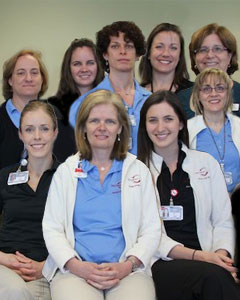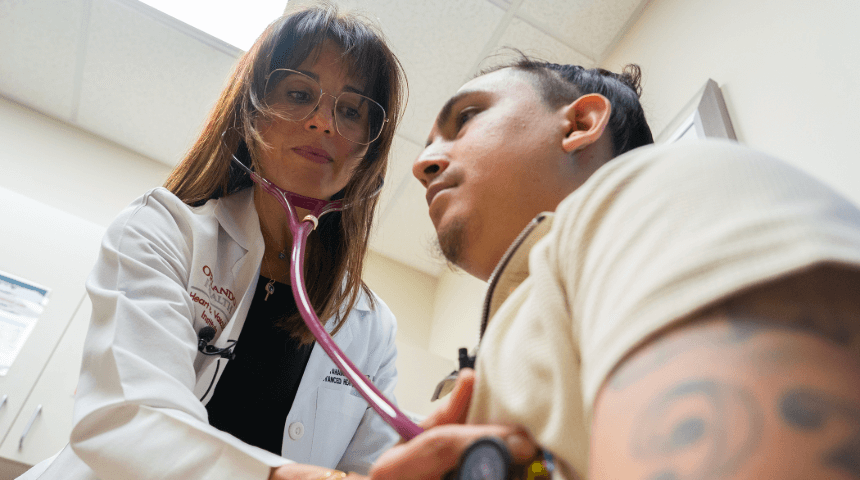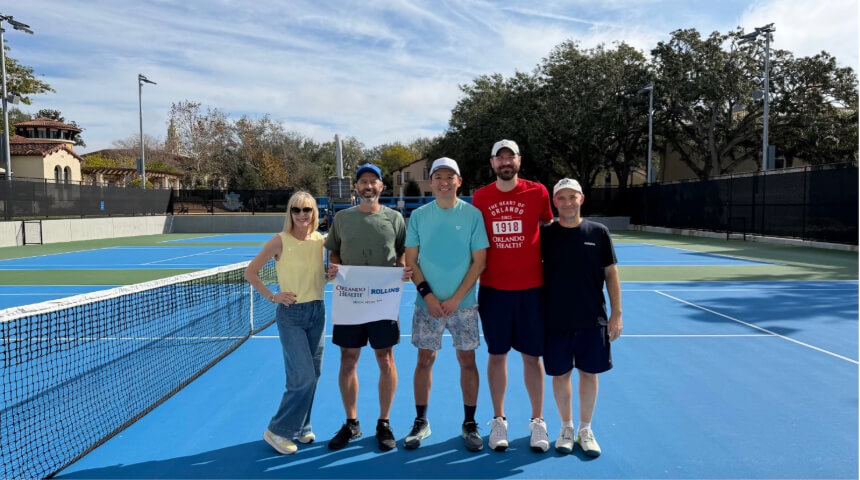Gaining mobility and independence through therapy at the Orlando Health Advanced Rehabilitation Institute
Among the highest-priority goals for a spinal cord injury patient in rehabilitation are: improving mobility and achieving as much independence in life as possible.
But the long road to recovery can be filled with setbacks and frustration, especially when the patient knows that his or her most heartfelt desires – for a paraplegic to walk again, or a quadriplegic to pick up a child – can never be realized.
However, for the patient who has a realistic understanding of attainable goals and a positive attitude about working hard towards them, rehabilitation can make the difference between a largely independent and very fulfilling life, versus one in which a person succumbs to hopelessness and self-pity.
Specialists at the Orlando Health Advanced Rehabilitation Institute know that there is no such thing as a one-size-fits-all treatment regimen for a spinal cord injury patient. Not only is every individual unique, but the person’s level of injury can matter, too. Variables such as whether they are fresh out of the hospital or have been in rehab before, and how much the patient has mentally adjusted to their disability, can make a difference in his/her response to treatment.
A patient starting the rehabilitation process is introduced to a whole new world. It becomes a place where simple tasks that were once second nature, now come with a learning curve.
Patients must learn how to take care of themselves again, by accepting special accommodations for bladder and bowel function, and learning routine care methods. Pressure sores can develop from being in one position for a prolonged amount of time, so things such as shifting body weight in a wheelchair or rolling over in bed, must become the new normal.
Physical therapy, whether in one’s home or in an outpatient rehab facility, may be prescribed for an hour, twice or more a week. Setting goals at the beginning of rehabilitation therapy is crucial to a patient’s success. “As the patient sees himself or herself reaching certain benchmarks, confidence grows and progress can be measured,” says Mariel Repetto, a physical therapist at the Orlando Health Advanced Rehabilitation Institute.
“We teach them the importance of working toward independence,” she says. “Important steps include getting them to verbalize instructions to their caregiver and learning how to do the exercises at home.”
Patients are taught range-of-motion exercises with the limbs they can use to prevent the muscles from becoming weak and/or contracting until they are rigid. Stretching and strengthening exercises are therapeutic, and help develop the upper-body strength paraplegics need to lift themselves in and out of wheelchairs, sofas and beds. Working on mobility skills is another key step, so that patients can learn to transfer to the wheelchair from bed without help, and to be able to operate a wheelchair safely.
Gaining a new perspective on paralysis through rehab
David Kellam was a football star at Winter Park High School, and continued his football dream by playing at Concord University in West Virginia. Tragically, a motorcycle accident in June 2010 left David, 25 years old, paralyzed from the waist down. Now attending college in Orlando and working toward a degree in business, David works with therapists at the Orlando Health Advanced Rehabilitation Institute twice a week. With the help of leg braces, he is working on trying to move his legs by using his back muscles.
“I’ve made tons of progress,” he says. “I can stand for about 10 seconds without holding on to anything.”
David credits prayer, a positive attitude and supportive family and friends for helping him to keep looking forward to a better future.
“My thing is, it could always be worse,” he says, citing the tingling he felt in his arms from his neck injury after the accident. But the cervical condition improved, so he now has the full use of his arms and hands.
While he does not expect to regain the independent use of his legs, he is determined to walk again.
“My goal is to walk with forearm crutches and leg braces.”
David recently set a goal to stand at his wedding. Watch as his goal becomes a reality, here:
To make an appointment at the Orlando Health Advanced Rehabilitation Institute, call (321) 841-4161





